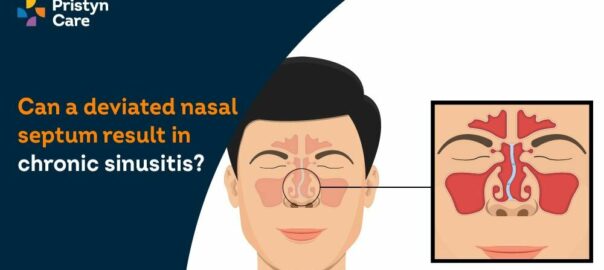![]() Views: 813
Views: 813
When is Septoplasty Recommended for Deviated Nasal Septum
A deviated nasal septum is a common condition that can occur in most individuals. A large number of people usually experience breathing issues at some point in their life which can be a result of a deviated septum. The complexity in the deviated nasal septum usually determines if ...
/disease/deviated-nasal-septum/">septoplasty surgery is required or not. . Read moreDedicated Support at Every Step!
Our Doctors are available 24 hours a day, 7 days a week to help you!
A nasal septum is a soft cartilage present between the nose that divides the left and right nostrils. Deviation in the nasal septum indicates the inclination in the nasal septum towards either side that obstructs the natural passage of the airflow. People with mild deviation in the septum do not usually experience any major health issues that can alter their normal well-being. The symptoms caused due to mild deviation can be managed by medications and home remedies. However, in case of complex nasal deviation, either due to birth defects or accidental, if it causes significant breathing issues, then surgical intervention - septoplasty surgery is the best course of action.
Let us understand what are the early signs and symptoms of a deviated nasal septum and why you should undergo septoplasty.
Table of Contents
Impact of the Deviated Nasal Septum in Everyday Life
Deviated nasal septum usually gets unnoticed by a majority of people until the symptoms become recurrent or cause grave discomfort. Prolonged deviation in the nasal septum impacts the quality of life and can lead to several complications. A deviated nasal septum usually results in the following conditions that can become chronic or recurrent -
- Sleep apnea - Deviation in the septum negatively impacts sleep due to nasal congestion making it hard to fall asleep easily. It also results in mouth breathing, snoring, etc.
- Chronic nosebleeds - When the airflow is restricted due to deviated septum, the delicate membranes in the nose become dry, resulting in unpredictable nosebleeds.
- Recurrent sinus infection - The partial obstruction in the nasal passage due to the inclination can increase the frequency of sinus infections.
- Difficulty breathing through the nose - Breathing issues are one of the most common symptoms of a deviated nasal septum which are usually more challenging when you have a cold.
- Nasal congestion on one side - The deviation in the nasal septum causes congestion and makes your nose stuffy on either side. This leads to improper sinus drainage, especially in patients with allergies and colds.
Read more: Everything You Need To Know About Deviated Nasal Septum
No Cost EMI, Hassle-free Insurance Approval
Breathe Easier and Better with Advanced Septoplasty Surgery
Thanks to the development in modern medicine and technology, you can undergo advanced septoplasty procedures to correct the nasal deviation for improved breathing. The nasal deviation is usually categorized into two types - slight nasal deviation and complex nasal deviation. In case of slight nasal deviation, the ENT specialist often recommends non-surgical procedures such as medications, nasal sprays, decongestants, etc. to manage the symptoms. However, in the case of complex nasal deviation, septoplasty procedure is highly inevitable. The hospital or our doctor will provide you with instructions prior to your septoplasty procedure for a smooth surgery experience.
Septoplasty procedure involves a minimal incision on the side of the nose to access the septum. The patient is administered with general anesthesia before the surgery to ensure a minimal pain procedure. The surgeon then carefully lifts the protective covering of the septum called the mucous membrane to move the deviated septum in the desired position. The surgeon also removes any obstruction, such as an extra bone or cartilage, for improved airflow through the nose.
Finally, the mucous membrane is repositioned, and the wound is shut using surgical sutures. In addition, the surgeon may also insert nose packing with cotton to keep the nasal septum in position. The surgery time for septoplasty is usually between 40 minutes to 1 hour, depending on the complexity of the nasal deviation and the surgical experience of the ENT surgeon.
Sometimes, the surgeon may conduct a simultaneous rhinoplasty, which is a cosmetic procedure to change the appearance of the nose. Rhinoplasty, unlike septoplasty, has no medical benefits and is done to achieve the aesthetic yardsticks. It usually depends on the preference of the patient after consulting with the specialist.
Can I Prevent Deviation in the Nasal Septum?
Deviation in the nasal septum can be due to congenital disabilities or develop later in life due to accidental trauma. Therefore, it is important to take adequate preventive measures to avoid instances such as accidental encounters, which can result in the deviation of the nasal septum. It is important to be aware of the symptoms and consult the ENT specialist whenever it is deemed necessary.
Certain activities which are considered a risk factor for the deviated nasal septum can be restricted to an extent. People who are involved in contact sports such as rugby, football, wrestling, boxing, etc., are usually at a high risk of incurring injury to the nose. Accidental traumas can also lead to a major nose injury. Therefore, it is always recommended that you wear a helmet while riding a two-wheeler and protect your nose whenever you can.
Conclusion
Septoplasty is a major surgery that is done to fix the inclination of the nasal septum to improve the airflow from the nose, thus improving the natural ventilation of the nasal passage. Individuals who suffer from sleep apnea, chronic nosebleeds, frequent sinus infection, loud snoring, etc., benefit highly from the septoplasty. Consult Pristyn Care for booking an appointment near your area and undergo advanced septoplasty surgery by top ENT specialists for improved breathing and better quality of life.










